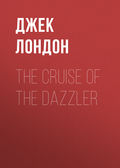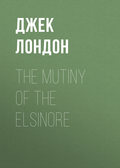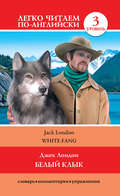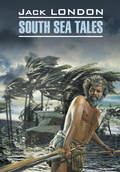
Джек Лондон
A Son Of The Sun
Chapter Eight – THE PEARLS OF PARLAY
I
The Kanaka helmsman put the wheel down, and the Malahini slipped into the eye of the wind and righted to an even keel. Her head-sails emptied, there was a rat-tat of reef-points and quick shifting of boom-tackles, and she was heeled over and filled away on the other tack. Though it was early morning and the wind brisk, the five white men who lounged on the poop-deck were scantily clad. David Grief, and his guest, Gregory Mulhall, an Englishman, were still in pajamas, their naked feet thrust into Chinese slippers. The captain and mate were in thin undershirts and unstarched duck pants, while the supercargo still held in his hands the undershirt he was reluctant to put on. The sweat stood out on his forehead, and he seemed to thrust his bare chest thirstily into the wind that did not cool.
“Pretty muggy, for a breeze like this,” he complained.
“And what’s it doing around in the west? That’s what I want to know,” was Grief’s contribution to the general plaint.
“It won’t last, and it ain’t been there long,” said Hermann, the Holland mate. “She is been chop around all night – five minutes here, ten minutes there, one hour somewhere other quarter.”
“Something makin ‘, something makin ‘,” Captain Warfield croaked, spreading his bushy beard with the fingers of both hands and shoving the thatch of his chin into the breeze in a vain search for coolness. “Weather’s been crazy for a fortnight. Haven’t had the proper trades in three weeks. Everything’s mixed up. Barometer was pumping at sunset last night, and it’s pumping now, though the weather sharps say it don’t mean anything. All the same, I’ve got a prejudice against seeing it pump. Gets on my nerves, sort of, you know. She was pumping that way the time we lost the Lancaster. I was only an apprentice, but I can remember that well enough. Brand new, four-masted steel ship; first voyage; broke the old man’s heart. He’d been forty years in the company. Just faded way and died the next year.”
Despite the wind and the early hour, the heat was suffocating. The wind whispered coolness, but did not deliver coolness. It might have blown off the Sahara, save for the extreme humidity with which it was laden. There was no fog nor mist, nor hint of fog or mist, yet the dimness of distance produced the impression. There were no defined clouds, yet so thickly were the heavens covered by a messy cloud-pall that the sun failed to shine through.
“Ready about!” Captain Warfield ordered with slow sharpness.
The brown, breech-clouted Kanaka sailors moved languidly but quickly to head-sheets and boom-tackles.
“Hard a-lee!”
The helmsman ran the spokes over with no hint of gentling, and the Malahini darted prettily into the wind and about.
“Jove! she’s a witch!” was Mulhall’s appreciation. “I didn’t know you South Sea traders sailed yachts.”
“She was a Gloucester fisherman originally,” Grief explained, “and the Gloucester boats are all yachts when it comes to build, rig, and sailing.”
“But you’re heading right in – why don’t you make it?” came the Englishman’s criticism.
“Try it, Captain Warfield,” Grief suggested. “Show him what a lagoon entrance is on a strong ebb.”
“Close-and-by!” the captain ordered.
“Close-and-by,” the Kanaka repeated, easing half a spoke.
The Malahini laid squarely into the narrow passage which was the lagoon entrance of a large, long, and narrow oval of an atoll. The atoll was shaped as if three atolls, in the course of building, had collided and coalesced and failed to rear the partition walls. Cocoanut palms grew in spots on the circle of sand, and there were many gaps where the sand was too low to the sea for cocoanuts, and through which could be seen the protected lagoon where the water lay flat like the ruffled surface of a mirror. Many square miles of water were in the irregular lagoon, all of which surged out on the ebb through the one narrow channel. So narrow was the channel, so large the outflow of water, that the passage was more like the rapids of a river than the mere tidal entrance to an atoll. The water boiled and whirled and swirled and drove outward in a white foam of stiff, serrated waves. Each heave and blow on her bows of the upstanding waves of the current swung the Malahini off the straight lead and wedged her as with wedges of steel toward the side of the passage. Part way in she was, when her closeness to the coral edge compelled her to go about. On the opposite tack, broadside to the current, she swept seaward with the current’s speed.
“Now’s the time for that new and expensive engine of yours,” Grief jeered good-naturedly.
That the engine was a sore point with Captain Warfield was patent. He had begged and badgered for it, until in the end Grief had given his consent.
“It will pay for itself yet,” the captain retorted, “You wait and see. It beats insurance and you know the underwriters won’t stand for insurance in the Paumotus.”
Grief pointed to a small cutter beating up astern of them on the same course.
“I’ll wager a five-franc piece the little Nuhiva beats us in.”
“Sure,” Captain Warfield agreed. “She’s overpowered. We’re like a liner alongside of her, and we’ve only got forty horsepower. She’s got ten horse, and she’s a little skimming dish. She could skate across the froth of hell, but just the same she can’t buck this current. It’s running ten knots right now.”
And at the rate of ten knots, buffeted and jerkily rolled, the Malahini went out to sea with the tide.
“She’ll slacken in half an hour – then we’ll make headway,” Captain Warfield said, with an irritation explained by his next words. “He has no right to call it Parlay. It’s down on the admiralty charts, and the French charts, too, as Hikihoho. Bougainville discovered it and named it from the natives.”
“What’s the name matter?” the supercargo demanded, taking advantage of speech to pause with arms shoved into the sleeves of the undershirt. “There it is, right under our nose, and old Parlay is there with the pearls.”
“Who see them pearl?” Hermann queried, looking from one to another.
“It’s well known,” was the supercargo’s reply. He turned to the steersman: “Tai-Hotauri, what about old Parlay’s pearls?”
The Kanaka, pleased and self-conscious, took and gave a spoke.
“My brother dive for Parlay three, four month, and he make much talk about pearl. Hikihoho very good place for pearl.”
“And the pearl-buyers have never got him to part with a pearl,” the captain broke in.
“And they say he had a hatful for Armande when he sailed for Tahiti,” the supercargo carried on the tale. “That’s fifteen years ago, and he’s been adding to it ever since – stored the shell as well. Everybody’s seen that – hundreds of tons of it. They say the lagoon’s fished clean now. Maybe that’s why he’s announced the auction.”
“If he really sells, this will be the biggest year’s output of pearls in the Paumotus,” Grief said.
“I say, now, look here!” Mulhall burst forth, harried by the humid heat as much as the rest of them. “What’s it all about? Who’s the old beachcomber anyway? What are all these pearls? Why so secretious about it?”
“Hikihoho belongs to old Parlay,” the supercargo answered. “He’s got a fortune in pearls, saved up for years and years, and he sent the word out weeks ago that he’d auction them off to the buyers to-morrow. See those schooners’ masts sticking up inside the lagoon?”
“Eight, so I see,” said Hermann.
“What are they doing in a dinky atoll like this?” the supercargo went on. “There isn’t a schooner-load of copra a year in the place. They’ve come for the auction. That’s why we’re here. That’s why the little Nuhiva’s bumping along astern there, though what she can buy is beyond me. Narii Herring – he’s an English Jew half-caste – owns and runs her, and his only assets are his nerve, his debts, and his whiskey bills. He’s a genius in such things. He owes so much that there isn’t a merchant in Papeete who isn’t interested in his welfare. They go out of their way to throw work in his way. They’ve got to, and a dandy stunt it is for Narii. Now I owe nobody. What’s the result? If I fell down in a fit on the beach they’d let me lie there and die. They wouldn’t lose anything. But Narii Herring? – what wouldn’t they do if he fell in a fit? Their best wouldn’t be too good for him. They’ve got too much money tied up in him to let him lie. They’d take him into their homes and hand-nurse him like a brother. Let me tell you, honesty in paying bills ain’t what it’s cracked up to be.”
“What’s this Narii chap got to do with it?” was the Englishman’s short-tempered demand. And, turning to Grief, he said, “What’s all this pearl nonsense? Begin at the beginning.”
“You’ll have to help me out,” Grief warned the others, as he began. “Old Parlay is a character. From what I’ve seen of him I believe he’s partly and mildly insane. Anyway, here’s the story: Parlay’s a full-blooded Frenchman. He told me once that he came from Paris. His accent is the true Parisian. He arrived down here in the old days. Went to trading and all the rest. That’s how he got in on Hikihoho. Came in trading when trading was the real thing. About a hundred miserable Paumotans lived on the island. He married the queen – native fashion. When she died, everything was his. Measles came through, and there weren’t more than a dozen survivors. He fed them, and worked them, and was king. Now before the queen died she gave birth to a girl. That’s Armande. When she was three he sent her to the convent at Papeete. When she was seven or eight he sent her to France. You begin to glimpse the situation. The best and most aristocratic convent in France was none too good for the only daughter of a Paumotan island king and capitalist, and you know the old country French draw no colour line. She was educated like a princess, and she accepted herself in much the same way. Also, she thought she was all-white, and never dreamed of a bar sinister.
“Now comes the tragedy. The old man had always been cranky and erratic, and he’d played the despot on Hikihoho so long that he’d got the idea in his head that there was nothing wrong with the king – or the princess either. When Armande was eighteen he sent for her. He had slews and slathers of money, as Yankee Bill would say. He’d built the big house on Hikihoho, and a whacking fine bungalow in Papeete. She was to arrive on the mail boat from New Zealand, and he sailed in his schooner to meet her at Papeete. And he might have carried the situation off, despite the hens and bull-beasts of Papeete, if it hadn’t been for the hurricane. That was the year, wasn’t it, when Manu-Huhi was swept and eleven hundred drowned?”
The others nodded, and Captain Warfield said: “I was in the Magpie that blow, and we went ashore, all hands and the cook, Magpie and all, a quarter of a mile into the cocoanuts at the head of Taiohae Bay – and it a supposedly hurricane-proof harbour.”
“Well,” Grief continued, “old Parlay got caught in the same blow, and arrived in Papeete with his hatful of pearls three weeks too late. He’d had to jack up his schooner and build half a mile of ways before he could get her back into the sea.
“And in the meantime there was Armande at Papeete. Nobody called on her. She did, French fashion, make the initial calls on the Governor and the port doctor. They saw her, but neither of their hen-wives was at home to her nor returned the call. She was out of caste, without caste, though she had never dreamed it, and that was the gentle way they broke the information to her. There was a gay young lieutenant on the French cruiser. He lost his heart to her, but not his head. You can imagine the shock to this young woman, refined, beautiful, raised like an aristocrat, pampered with the best of old France that money could buy. And you can guess the end.” He shrugged his shoulders. “There was a Japanese servant in the bungalow. He saw it. Said she did it with the proper spirit of the Samurai. Took a stiletto – no thrust, no drive, no wild rush for annihilation – took the stiletto, placed the point carefully against her heart, and with both hands, slowly and steadily, pressed home.
“Old Parlay arrived after that with his pearls. There was one single one of them, they say, worth sixty thousand francs. Peter Gee saw it, and has told me he offered that much for it. The old man went clean off for a while. They had him strait-jacketed in the Colonial Club two days – ”
“His wife’s uncle, an old Paumotan, cut him out of the jacket and turned him loose,” the supercargo corroborated.
“And then old Parlay proceeded to eat things up,” Grief went on. “Pumped three bullets into the scalawag of a lieutenant – ”
“Who lay in sick bay for three months,” Captain Warfield contributed.
“Flung a glass of wine in the Governor’s face; fought a duel with the port doctor; beat up his native servants; wrecked the hospital; broke two ribs and the collarbone of a man nurse, and escaped; and went down to his schooner, a gun in each hand, daring the chief of police and all the gendarmes to arrest him, and sailed for Hikihoho. And they say he’s never left the island since.”
The supercargo nodded. “That was fifteen years ago, and he’s never budged.”
“And added to his pearls,” said the captain. “He’s a blithering old lunatic. Makes my flesh creep. He’s a regular Finn.”
“What’s that?” Mulhall inquired.
“Bosses the weather – that’s what the natives believe, at any rate. Ask Tai-Hotauri there. Hey, Tai-Hotauri! what you think old Parlay do along weather?”
“Just the same one big weather devil,” came the Kanaka’s answer. “I know. He want big blow, he make big blow. He want no wind, no wind come.”
“A regular old Warlock,” said Mulhall.
“No good luck them pearl,” Tai-Hotauri blurted out, rolling his head ominously. “He say he sell. Plenty schooner come. Then he make big hurricane, everybody finish, you see. All native men say so.”
“It’s hurricane season now,” Captain War-field laughed morosely. “They’re not far wrong. It’s making for something right now, and I’d feel better if the Malahini was a thousand miles away from here.”
“He is a bit mad,” Grief concluded. “I’ve tried to get his point of view. It’s – well, it’s mixed. For eighteen years he’d centred everything on Armande. Half the time he believes she’s still alive, not yet come back from France. That’s one of the reasons he held on to the pearls. And all the time he hates white men. He never forgets they killed her, though a great deal of the time he forgets she’s dead. Hello! Where’s your wind?”
The sails bellied emptily overhead, and Captain Warfield grunted his disgust. Intolerable as the heat had been, in the absence of wind it was almost overpowering. The sweat oozed out on all their faces, and now one, and again another, drew deep breaths, involuntarily questing for more air.
“Here she comes again – an eight point haul! Boom-tackles across! Jump!”
The Kanakas sprang to the captain’s orders, and for five minutes the schooner laid directly into the passage and even gained on the current. Again the breeze fell flat, then puffed from the old quarter, compelling a shift back of sheets and tackles.
“Here comes the Nuhiva” Grief said. “She’s got her engine on. Look at her skim.”
“All ready?” the captain asked the engineer, a Portuguese half-caste, whose head and shoulders protruded from the small hatch just for’ard of the cabin, and who wiped the sweat from his face with a bunch of greasy waste.
“Sure,” he replied.
“Then let her go.”
The engineer disappeared into his den, and a moment later the exhaust muffler coughed and spluttered overside. But the schooner could not hold her lead. The little cutter made three feet to her two and was quickly alongside and forging ahead. Only natives were on her deck, and the man steering waved his hand in derisive greeting and farewell.
“That’s Narii Herring,” Grief told Mulhall. “The big fellow at the wheel – the nerviest and most conscienceless scoundrel in the Paumotus.”
Five minutes later a cry of joy from their own Kanakas centred all eyes on the Nuhiva. Her engine had broken down and they were overtaking her. The Malahini’s sailors sprang into the rigging and jeered as they went by; the little cutter heeled over by the wind with a bone in her teeth, going backward on the tide.
“Some engine that of ours,” Grief approved, as the lagoon opened before them and the course was changed across it to the anchorage.
Captain Warfield was visibly cheered, though he merely grunted, “It’ll pay for itself, never fear.”
The Malahini ran well into the centre of the little fleet ere she found swinging room to anchor.
“There’s Isaacs on the Dolly,” Grief observed, with a hand wave of greeting. “And Peter Gee’s on the Roberta. Couldn’t keep him away from a pearl sale like this. And there’s Francini on the Cactus. They’re all here, all the buyers. Old Parlay will surely get a price.”
“They haven’t repaired the engine yet,” Captain Warfield grumbled gleefully.
He was looking across the lagoon to where the Nuhiva’s sails showed through the sparse cocoa-nuts.
II
The house of Parlay was a big two-story frame affair, built of California lumber, with a galvanized iron roof. So disproportionate was it to the slender ring of the atoll that it showed out upon the sand-strip and above it like some monstrous excrescence. They of the Malahini paid the courtesy visit ashore immediately after anchoring. Other captains and buyers were in the big room examining the pearls that were to be auctioned next day. Paumotan servants, natives of Hikihoho, and relatives of the owner, moved about dispensing whiskey and absinthe. And through the curious company moved Parlay himself, cackling and sneering, the withered wreck of what had once been a tall and powerful man. His eyes were deep sunken and feverish, his cheeks fallen in and cavernous. The hair of his head seemed to have come out in patches, and his mustache and imperial had shed in the same lopsided way.
“Jove!” Mulhall muttered under his breath. “A long-legged Napoleon the Third, but burnt out, baked, and fire-crackled. And mangy! No wonder he crooks his head to one side. He’s got to keep the balance.”
“Goin’ to have a blow,” was the old man’s greeting to Grief. “You must think a lot of pearls to come a day like this.”
“They’re worth going to inferno for,” Grief laughed genially back, running his eyes over the surface of the table covered by the display.
“Other men have already made that journey for them,” old Parlay cackled. “See this one!” He pointed to a large, perfect pearl the size of a small walnut that lay apart on a piece of chamois. “They offered me sixty thousand francs for it in Tahiti. They’ll bid as much and more for it to-morrow, if they aren’t blown away. Well, that pearl, it was found by my cousin, my cousin by marriage. He was a native, you see. Also, he was a thief. He hid it. It was mine. His cousin, who was also my cousin – we’re all related here – killed him for it and fled away in a cutter to Noo-Nau. I pursued, but the chief of Noo-Nau had killed him for it before I got there. Oh, yes, there are many dead men represented on the table there. Have a drink, Captain. Your face is not familiar. You are new in the islands?”
“It’s Captain Robinson of the Roberta,” Grief said, introducing them.
In the meantime Mulhall had shaken hands with Peter Gee.
“I never fancied there were so many pearls in the world,” Mulhall said.
“Nor have I ever seen so many together at one time,” Peter Gee admitted.
“What ought they to be worth?”
“Fifty or sixty thousand pounds – and that’s to us buyers. In Paris – ” He shrugged his shoulders and lifted his eyebrows at the incommunicableness of the sum.
Mulhall wiped the sweat from his eyes. All were sweating profusely and breathing hard. There was no ice in the drink that was served, and whiskey and absinthe went down lukewarm.
“Yes, yes,” Parlay was cackling. “Many dead men lie on the table there. I know those pearls, all of them. You see those three! Perfectly matched, aren’t they? A diver from Easter Island got them for me inside a week. Next week a shark got him; took his arm off and blood poison did the business. And that big baroque there – nothing much – if I’m offered twenty francs for it to-morrow I’ll be in luck; it came out of twenty-two fathoms of water. The man was from Raratonga. He broke all diving records. He got it out of twenty-two fathoms. I saw him. And he burst his lungs at the same time, or got the ‘bends,’ for he died in two hours. He died screaming. They could hear him for miles. He was the most powerful native I ever saw. Half a dozen of my divers have died of the bends. And more men will die, more men will die.”
“Oh, hush your croaking, Parlay,” chided one of the captains. “It ain’t going to blow.”
“If I was a strong man, I couldn’t get up hook and get out fast enough,” the old man retorted in the falsetto of age. “Not if I was a strong man with the taste for wine yet in my mouth. But not you. You’ll all stay, I wouldn’t advise you if I thought you’d go, You can’t drive buzzards away from the carrion. Have another drink, my brave sailor-men. Well, well, what men will dare for a few little oyster drops! There they are, the beauties! Auction to-morrow, at ten sharp. Old Parlay’s selling out, and the buzzards are gathering – old Parlay who was a stronger man in his day than any of them and who will see most of them dead yet.”
“If he isn’t a vile old beast!” the supercargo of the Malahini whispered to Peter Gee.
“What if she does blow?” said the captain of the Dolly. “Hikihoho’s never been swept.”
“The more reason she will be, then,” Captain Warfield answered back. “I wouldn’t trust her.”
“Who’s croaking now?” Grief reproved.
“I’d hate to lose that new engine before it paid for itself,” Captain Warfield replied gloomily.
Parlay skipped with astonishing nimbleness across the crowded room to the barometer on the wall.
“Take a look, my brave sailormen!” he cried exultantly.
The man nearest read the glass. The sobering effect showed plainly on his face.
“It’s dropped ten,” was all he said, yet every face went anxious, and there was a look as if every man desired immediately to start for the door.
“Listen!” Parlay commanded.
In the silence the outer surf seemed to have become unusually loud. There was a great rumbling roar.
“A big sea is beginning to set,” some one said; and there was a movement to the windows, where all gathered.
Through the sparse cocoanuts they gazed seaward. An orderly succession of huge smooth seas was rolling down upon the coral shore. For some minutes they gazed on the strange sight and talked in low voices, and in those few minutes it was manifest to all that the waves were increasing in size. It was uncanny, this rising sea in a dead calm, and their voices unconsciously sank lower. Old Parlay shocked them with his abrupt cackle.
“There is yet time to get away to sea, brave gentlemen. You can tow across the lagoon with your whaleboats.”
“It’s all right, old man,” said Darling, the mate of the Cactus, a stalwart youngster of twenty-five. “The blow’s to the southward and passing on. We’ll not get a whiff of it.”
An air of relief went through the room. Conversations were started, and the voices became louder. Several of the buyers even went back to the table to continue the examination of the pearls.
Parlay’s shrill cackle rose higher.
“That’s right,” he encouraged. “If the world was coming to an end you’d go on buying.”
“We’ll buy these to-morrow just the same,” Isaacs assured him.
“Then you’ll be doing your buying in hell.”
The chorus of incredulous laughter incensed the old man. He turned fiercely on Darling.
“Since when have children like you come to the knowledge of storms? And who is the man who has plotted the hurricane-courses of the Paumotus? What books will you find it in? I sailed the Paumotus before the oldest of you drew breath. I know. To the eastward the paths of the hurricanes are on so wide a circle they make a straight line. To the westward here they make a sharp curve. Remember your chart. How did it happen the hurricane of ‘91 swept Auri and Hiolau? The curve, my brave boy, the curve! In an hour, or two or three at most, will come the wind. Listen to that!”
A vast rumbling crash shook the coral foundations of the atoll. The house quivered to it. The native servants, with bottles of whiskey and absinthe in their hands, shrank together as if for protection and stared with fear through the windows at the mighty wash of the wave lapping far up the beach to the corner of a copra-shed.
Parlay looked at the barometer, giggled, and leered around at his guests. Captain War-field strode across to see.
“29:75,” he read. “She’s gone down five more. By God! the old devil’s right. She’s a-coming, and it’s me, for one, for aboard.”
“It’s growing dark,” Isaacs half whispered.
“Jove! it’s like a stage,” Mulhall said to Grief, looking at his watch. “Ten o’clock in the morning, and it’s like twilight. Down go the lights for the tragedy. Where’s the slow music!”
In answer, another rumbling crash shook the atoll and the house. Almost in a panic the company started for the door. In the dim light their sweaty faces appeared ghastly. Isaacs panted asthmatically in the suffocating heat.
“What’s your haste?” Parlay chuckled and girded at his departing guests. “A last drink, brave gentlemen.” No one noticed him. As they took the shell-bordered path to the beach he stuck his head out the door and called, “Don’t forget, gentlemen, at ten to-morrow old Parlay sells his pearls.”
III
On the beach a curious scene took place. Whaleboat after whaleboat was being hurriedly manned and shoved off. It had grown still darker. The stagnant calm continued, and the sand shook under their feet with each buffet of the sea on the outer shore. Narii Herring walked leisurely along the sand. He grinned at the very evident haste of the captains and buyers. With him were three of his Kanakas, and also Tai-Hotauri.
“Get into the boat and take an oar,” Captain Warfield ordered the latter.
Tai-Hotauri came over jauntily, while Narii Herring and his three Kanakas paused and looked on from forty feet away.
“I work no more for you, skipper,” Tai-Hotauri said insolently and loudly. But his face belied his words, for he was guilty of a prodigious wink. “Fire me, skipper,” he huskily whispered, with a second significant wink.
Captain Warfield took the cue and proceeded to do some acting himself. He raised his fist and his voice.
“Get into that boat,” he thundered, “or I’ll knock seven bells out of you!”
The Kanaka drew back truculently, and Grief stepped between to placate his captain.
“I go to work on the Nuhiva,” Tai-Hotauri said, rejoining the other group.
“Come back here!” the captain threatened.
“He’s a free man, skipper,” Narii Herring spoke up. “He’s sailed with me in the past, and he’s sailing again, that’s all.”
“Come on, we must get on board,” Grief urged. “Look how dark it’s getting.”
Captain Warfield gave in, but as the boat shoved off he stood up in the sternsheets and shook his fist ashore.
“I’ll settle with you yet, Narii,” he cried. “You’re the only skipper in the group that steals other men’s sailors,” He sat down, and in lowered voice queried: “Now what’s Tai-Hotauri up to? He’s on to something, but what is it?”
IV
As the boat came alongside the Malahini, Hermann’s anxious face greeted them over the rail.
“Bottom out fall from barometer,” he announced. “She’s goin’ to blow. I got starboard anchor overhaul.”
“Overhaul the big one, too,” Captain Warfield ordered, taking charge. “And here, some of you, hoist in this boat. Lower her down to the deck and lash her bottom up.”
Men were busy at work on the decks of all the schooners. There was a great clanking of chains being overhauled, and now one craft, and now another, hove in, veered, and dropped a second anchor. Like the Malahini, those that had third anchors were preparing to drop them when the wind showed what quarter it was to blow from.
The roar of the big surf continually grew though the lagoon lay in the mirror-like calm.
There was no sign of life where Parlay’s big house perched on the sand. Boat and copra-sheds and the sheds where the shell was stored were deserted.
“For two cents I’d up anchors and get out,” Grief said. “I’d do it anyway if it were open sea. But those chains of atolls to the north and east have us pocketed. We’ve a better chance right here. What do you think, Captain Warfield?”
“I agree with you, though a lagoon is no mill-pond for riding it out. I wonder where she’s going to start from? Hello! There goes one of Parlay’s copra-sheds.”
They could see the grass-thatched shed lift and collapse, while a froth of foam cleared the crest of the sand and ran down to the lagoon.
“Breached across!” Mulhall exclaimed. “That’s something for a starter. There she comes again!”
The wreck of the shed was now flung up and left on the sand-crest, A third wave buffeted it into fragments which washed down the slope toward the lagoon.
“If she blow I would as be cooler yet,” Hermann grunted. “No longer can I breathe. It is damn hot. I am dry like a stove.”
He chopped open a drinking cocoanut with his heavy sheath-knife and drained the contents. The rest of them followed his example, pausing once to watch one of Parlay’s shell sheds go down in ruin. The barometer now registered 29:50.
“Must be pretty close to the centre of the area of low pressure,” Grief remarked cheerfully. “I was never through the eye of a hurricane before. It will be an experience for you, too, Mulhall. From the speed the barometer’s dropped, it’s going to be a big one.”
Captain Warfield groaned, and all eyes drew to him. He was looking through the glasses down the length of the lagoon to the southeast.
“There she comes,” he said quietly.
They did not need glasses to see. A flying film, strangely marked, seemed drawing over the surface of the lagoon. Abreast of it, along the atoll, travelling with equal speed, was a stiff bending of the cocoanut palms and a blur of flying leaves. The front of the wind on the water was a solid, sharply defined strip of dark-coloured, wind-vexed water. In advance of this strip, like skirmishers, were flashes of windflaws. Behind this strip, a quarter of a mile in width, was a strip of what seemed glassy calm. Next came another dark strip of wind, and behind that the lagoon was all crisping, boiling whiteness.







